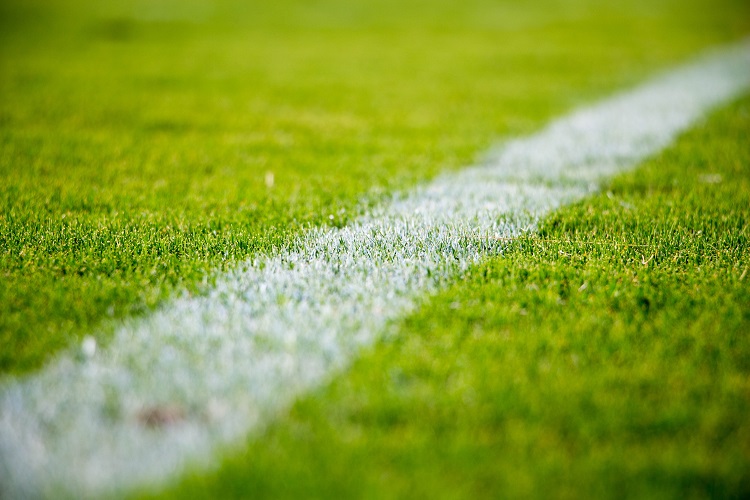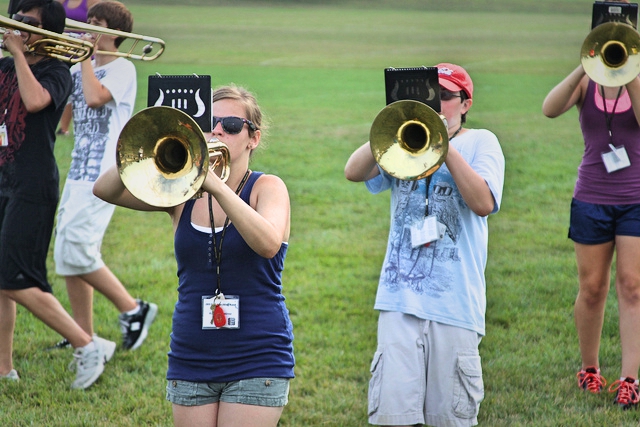 Band camp is on the horizon! Are you ready?
Band camp is on the horizon! Are you ready?
Many bands offer their own recommended list of items to have for band camp, so check with your director. Check out our recommendations below and feel free to add your own in the comments!
Sun/Heat Protection
Hat or Cap
A wide brim is recommended to help keep the sun out of your eyes. Something that covers your neck is even better! You can find hats that cover your neck in stores specializing in equipment for outdoor activities, as well as many online retailers.
Sunglasses
Keeping the sun out of your eyes will help you stay focused and attentive during band camp, and sunglasses keep your eyes protected from harmful UV rays that can create both short- and long-term damage.
Appropriate Clothing
It’s also important to have comfortable, loose-fitting, light-colored clothes. Loose-fitting clothes allow your body to ventilate the heat better, while light-colored clothes don’t absorb heat as much as dark colors do (check with your band director/school for clothing policies, of course). The CDC has these tips and many others for preventing heat-related issues.
Comfortable Athletic Shoes
Wearing comfortable athletic shoes is a must! In fact, I can guarantee that any open-toed shoes or flip-flops will not be allowed by your director, though during free time may be a different story.
At the risk of stating the obvious, you’re going to be on your feet all day – you don’t need the blisters that would come from inappropriate footwear.
Many shoes would prevent you from marching properly in the first place, so it’s a good idea to have a good pair of sneakers or tennis shoes (or whatever you call them where you’re from!) and leave most everything else at home.
Sunscreen
We recommend sunscreen with a minimum SPF30, and enough to reapply multiple times daily. Look for sunscreens that say “broad spectrum” or “UVA/UVB protection” on their labels – these products work best.
Water/Hydration (Gatorade and the like)
Be sure to have an insulated, refillable container that can be used throughout the day. Drink regularly, as the heat of band camp can dehydrate you quickly. Your body needs its fluids replenished often in the heat.
Don’t wait until you feel thirsty!
Insect repellent
Bugs may or may not be a problem in your band camp locale, but if they are, a safe, effective insect repellent will be very useful.
Band Camp Equipment
Pencil
Yes, you may have to write stuff down.
Make that, “will”.
And having at least two in your case is a good idea, especially when you need to bail out your friend who forgot theirs.
Flip Folder & Extra Windows
Flip folders hold your music while you march and are a useful tool while you’re learning the music.
A standard flip folder only comes with 5 windows (pages) though, so make sure you have plenty more on hand! Each window holds two small sheets of marching band music, so if you have more than 10 sheets, you’ll need the additional windows.
Lyre
Everyone needs a lyre, which is an item that attaches to your instrument and holds the flip folder. They all have a slightly different look, though, so be sure to get the one that’s designed for your instrument. Flutists need an item called a Flutist’s Friend, which is a lyre/flip folder-in-one that attaches to your wrist. Drummers can also get a lyre/flip folder combo that attaches to the various drum types (snare/tenor, bass).
Dot Book
For those who don’t know, a dot book is small set of notes often hung around the neck or waist of each marching member so they can see what ‘dot’ on the field they’re to occupy for each ‘set’ or ‘formation’.
All bands do things differently. Depending on how your band functions, you likely fall into one of three categories:
- Your band doesn’t use them.
- Your director provides pre-filled dot books
- Your director expects your child to have a dot book they fill in as they learn each set.
If you’re director provides pre-filled, dot-books, you’ll likely get them at camp, or even at a pre-camp. If that’s the case, don’t forget to bring it.
If you have to provide your own, often yarn or string woven through the spiral binding of a mini note-pad will do the trick.
Instrument necessities
Every instrument needs certain things to operate correctly, so make sure you have what you need for yours.
Reeds/mouthpieces/straps
Woodwind players, your reeds are your lifeblood, so stock up. You will go through plenty during band camp. We don’t normally recommend them, but some players consider synthetic reeds for marching band due to their durability.
Mouthpieces and ligatures also need to be considered. Having an extra of each in case of drops/accidents, which are common in the band camp setting, can be a lifesaver. Saxophone players should have a comfortable, padded strap that distributes weight well and protects your neck.
Brass players, your mouthpieces may not be as fragile as the woodwinds, but bad things (bent shanks, scratched rims, loss of the mouthpiece) still happen, so be prepared with an extra!
Lubricants
For brass players, lubricants are the name of the game for you that reeds are to the woodwinds! Valve oil for trumpets and marching brass like mellophones and marching baritones, slide oil or cream for trombones, and tuning slide grease (all brass) must be in abundant supply for band camp to keep things working.
For reed players, cork grease is necessary but inexpensive, so don’t forget it.
Don’t make things worse for yourself!
Keep in mind that band camp is probably not the best time to experiment with new reeds, mouthpieces, etc. You want to have something you can count on at this point, so stick with the equipment that has served you well in the past.
Cleaning supplies
All instruments have their own cleaning needs, so be sure you have what you need to take care of yours!
Swabs
Swabs help get moisture out of your instrument and away from your pads and working parts.
Clarinetists need to have a reliable body swab. This is usually an item made from a silk or chamois style material with a pull string attached so the swab can be drawn through the instrument.
Saxophonists need a swab each for the body and the neck. The body swab will be similar to the clarinet, only larger and with more material and a longer pull string. The neck cleaner can be a silk type material or a snake style brush. Either way, it needs to be small enough to fit through your neck without getting stuck, but good at cleaning out build-up in the neck.
Cleaning snakes/brushes
Cleaning snakes help keep the bore of your brass instrument clean. Use them to clean out the tuning slides as well as the leadpipe to remove debris and build-up. Trombone snakes have to be longer than ones for trumpet, to make sure they can get through the entire length of the handslide.
Valve brushes help keep piston valves clean and operational by cleaning out the valve casing. This is essential because your valves are made to fit snugly into the casing. Anything inside the casing besides the valve and the oil is an obstacle, and will make your valve sluggish or completely non-operational. The same holds true for the trombone slide. Anything in there besides your lubricant is going to be a problem.
Clarinets/saxes and all brass players can benefit from a mouthpiece brush. A mouthpiece brush for woodwinds is wider than one for brass, as woodwind mouthpieces have a larger area to cover inside the mouthpiece. Brass mouthpiece brushes are quite thin. You’d be surprised how much this small, inexpensive item will do to keep not just your mouthpiece but your entire instrument cleaner!
Polish Cloth
Keep your instrument looking good with an appropriate polish cloth. Most instruments use a soft non-treated polish cloth, while flutists and players with silver or silver-plated instruments need a special cloth designed to remove tarnish.
Care Kit
If you purchased a care kit for your instrument at some point, now would be a good time to revisit that kit and see if you still have the products originally included in it. You may already have some of the items we’ve listed! Check the amounts for what you have and replenish all necessary items. If you don’t have one already, a care kit would be a great investment for band camp!
Be sure to pull it back out after camp is over, as well. All the time spent outside likely means you’ll have dirt or sand along with other grime on the outside of your instrument. At the same time, you may find gross stuff inside the instrument after all that playing, especially since you do plenty of playing relatively close to meal times.
Think about it: everything that is in your mouth when you play, goes into your instrument.
(Yeah, that’s gross, I know…but it’s reality!)
Repair issues
Instruments often sit idle over the summer (although we have 7 reasons why they shouldn’t). If your instrument is one of those, take it out and make sure it’s in good working condition. The last thing you need is mechanical issues during band camp.
Woodwind players should check all keys, pads, levers, springs, corks, etc. Brass players need to check all your moving parts: valves, tuning slides, hand slides, and water keys (or spit valves, as they are commonly called).
If there’s even a hint of a problem, take it to a certified repair technician.
Don’t try to fix it yourself! Often other problems can occur if you try, like breaking solder joints while trying to pull a tuning slide, or bending a key when it doesn’t appear to be closing properly.
Don’t wait! Whatever the problem is, it won’t fix itself, and any problem will most likely get worse under the intense demands of band camp.
You want to know your instrument is in tip-top shape to before you arrive!
A Good Attitude
 There’s no substitute for a good attitude when beginning a time of intensive training like band camp.
There’s no substitute for a good attitude when beginning a time of intensive training like band camp.
Come to camp well-rested and ready to work hard each day. Be focused and attentive. Be willing to listen to your director and band camp staff, as well as field commanders and other student-leadership.
Have patience with your bandmates, because everyone is learning; from the rookies – to which all of this is so new – to the upperclassmen who have been through this before and know the “tricks of the trade”.
Every marching band season brings with it its own lessons and challenges, so be ready to deal with them with a good attitude and a positive approach. The goal is to have fun while putting a great show on the field.
If everyone is focused on that, both the fun and the product will come.
Conclusion
Come to band camp prepared with the right equipment, your instrument in good condition, and the right attitude, and you’ll be ready to make a positive contribution to your marching band.
I hope you have a great camp and a great season!
What would you add to the checklist? What’s on this list that you don’t need in your situation? We’d love to hear from you!
photo credits: technochick via Foter.com / CC BY-SA; Jack_20130717_Canon7534 by Jack Bushon / CC-BY-ND; technochick via flickr.com / CC BY-SA







3 Comments
As a parent of a student who is now in post camp, I would strongly recommend putting a few band aids in the instrument case. Blisters will happen when the first aid kit is not available.
That’s a great idea, Theresa! I hope that it didn’t come from experience! 😉
chafing powder gold bond thick thighs and sweat dont mix